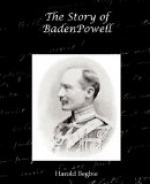[Illustration: B.-P. reflecting on the After-deck of the Pearl]
A favourite holiday haunt was Tunbridge Wells, where Ste’s grandfather owned a spacious and a fair demesne. Here, with miles of wood for exploration, brothers and sister were in their element. They would climb into the highest chestnut trees in the woods, taking up hampers and hay for the construction of nests, and at that exalted altitude play all manner of wild and romantic games. And yet they would also take up books into those cool branches and do lessons! Of Ste at this period his governess remarks, “It gave him great pleasure to enter a new rule in arithmetic”—an illuminative sentence, in which one sees the governess as well as the child.
It was here in Tunbridge Wells that Ste, with little Baden, now Guardsman and inventor of war-kites, spent laborious days in constructing a really serviceable dam in the river, digging there a deep hole in order to make themselves a luxurious bathing-place. From early infancy they had been taught to do for themselves. Master B.-P. could dress and undress himself before he was three years old, and at three he could speak tolerably well in German as well as English. The children were encouraged to get knowledge as some other children are encouraged to get bumptiousness; their parents delighted, and showed the children their delight, whenever a child did something sensible and clever; there was no unintelligent admiration of precocity.
The boys dug their own gardens, and from five years of age each child kept a most careful book of his expenditure by double entry. Their pennies went chiefly in books and presents, and omnibuses for long excursions out of London. There was no prohibition as to sweets, but never a penny of these earnest young double-entry bookkeepers found its way to the tuck-shop. However, a joke among the brothers was the following constant entry in the book of one of them: “Orange, L0:0:1.” But no chaff was strong enough to correct that healthy appetite, and “Orange, L0:0:1” went on through the happy years.
At eleven years of age, Ste was packed off to a small private school, and here he distinguished himself in the same manner, though of course on a smaller scale, as Mr. Gladstone did at Eton. His moral courage, coupled with his athletic prowess, made him the darling of the little school, and the headmaster sorrowfully told his mother when the boy’s two years’ schooling were over that he would thankfully keep him there without fee of any kind, because by force of character the plucky little fellow had raised the entire moral tone of the school.




